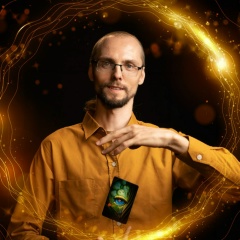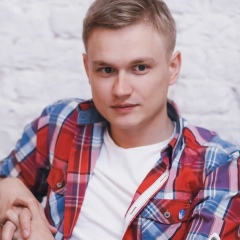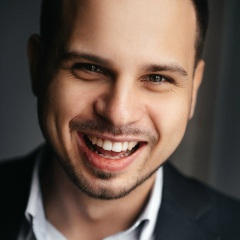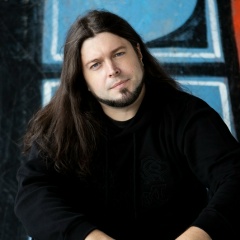https://facebook.com/298276320198577_2935235859835930
В 2000 году москвич Александр Шатров хотел найти несложную работу на время написания докторской. Его школьный друг Денис Мишин предложил аутсорсинговый ИТ-проект. Шатров согласился — и докторскую так и не дописал. Через 5 лет компания ушла от аутсорса и занялась собственными проектами, которые и выросли в крупный бизнес.
Сегодня Александр — совладелец группы компаний Synesis, где работает более 1000 сотрудников. Ежедневно продуктами группы компаний — интеллектуальными системами видеонаблюдения, играми и мессенджерами — пользуются около 100 млн человек.
Компетенции группы компаний Synesis — облачные вычисления, искусственный интеллект, чат-боты, хранение и обработка больших данных. Ей принадлежат десятки патентов и множество программ в области AI, Cloud, Big Data. Центр разработки Synesis создает технологии для своих проектов и для международных корпораций. Например, компания работала над созданием Viber, совместно с Playtika — над самой популярной слот-игрой в мире Slotomania. Системой документооборота Alfresco пользуются 11 млн человек, в том числе в Министерстве обороны США, NASA и CISCO.
С 2014 года Synesis фокусируется на собственных проектах. Самый заметный — платформа умного видеонаблюдения KIPOD, которая работает в 4 столицах (Минск, Москва, Баку, Астана).
— Александр, как вы пришли в бизнес?
— История начинается с того, что я в 1999 году, еще учась в институте, поехал получать PhD в Демонтфортский университет (Англия). Делал это бестолково, наездами. Каждый раз, когда я туда приезжал, у меня появлялся полемический задор, я начинал заниматься, а уезжал — и он пропадал.
В 2000 году, в мой очередной полемический задор, я спросил у своего школьного друга Дениса Мишина, есть ли у него проект, где можно ничего не делать, заниматься PhD и деньги получать.
Он отвечает: «Да-да, начинаем аутсорсинговый проект с американцами. Они считают, что понадобится человек 50. Я же считаю, что нужно 3, ты будешь 4-м». Прихожу, и на этом заканчивается мое PhD.
Американцы были правы.
На тот момент в Америке еще не случился кризис доткомов. Все радостно, безжалостно и беспощадно жгут деньги. Дилетанты с нашей стороны, дилетанты с той стороны. Это был самый дорогой университет по управлению ИТ-проектами, который можно было только представить. Не для нас, но для инвесторов.
А потом в Россию начинают приходить большие ИТ-компании. Еще не начался бум внутренних проектов (госзаказов), не сформировалось такой ситуации, когда денег никто не считает. Все еще работают на западные компании, экономят, платят «в серую». И тут корпорации радостно выгребают людей с рынка. Они предложили такие условия («белые» зарплаты, социальные пакеты для работников, командировки), к которым локальные игроки оказались просто не готовы. Людей не стало.
Мы, как и весь рынок, не были к этому готовы, и оказались в Минске. Город выбрали практически случайно. Мой партнер пришел и сказал: «Я прочитал в журнале, что есть такой город Минск. Там тоже водятся программисты». Так, 15 лет назад — в ноябре 2003 — я купил билет на поезд и отправился в Беларусь собеседовать кандидатов для нового центра разработки. Собеседовали целый день в кафе на стадионе «Динамо» и в январе 2004 открылись → https://probusiness.io/interview/5202-investory-diletanty-besposhchadno-zhgli-na-nas-dengi-soosnovatel-synesis-o-starte-biznesa-dogfudinge-i-nemytykh-nozhakh.html
(Илья Рабченок)
Сооснователь Synesis о старте бизнеса, догфудинге и немытых ножах
В 2000 году москвич Александр Шатров хотел найти несложную работу на время написания докторской. Его школьный друг Денис Мишин предложил аутсорсинговый ИТ-проект. Шатров согласился — и докторскую так и не дописал. Через 5 лет компания ушла от аутсорса и занялась собственными проектами, которые и выросли в крупный бизнес.
Сегодня Александр — совладелец группы компаний Synesis, где работает более 1000 сотрудников. Ежедневно продуктами группы компаний — интеллектуальными системами видеонаблюдения, играми и мессенджерами — пользуются около 100 млн человек.
Компетенции группы компаний Synesis — облачные вычисления, искусственный интеллект, чат-боты, хранение и обработка больших данных. Ей принадлежат десятки патентов и множество программ в области AI, Cloud, Big Data. Центр разработки Synesis создает технологии для своих проектов и для международных корпораций. Например, компания работала над созданием Viber, совместно с Playtika — над самой популярной слот-игрой в мире Slotomania. Системой документооборота Alfresco пользуются 11 млн человек, в том числе в Министерстве обороны США, NASA и CISCO.
С 2014 года Synesis фокусируется на собственных проектах. Самый заметный — платформа умного видеонаблюдения KIPOD, которая работает в 4 столицах (Минск, Москва, Баку, Астана).
— Александр, как вы пришли в бизнес?
— История начинается с того, что я в 1999 году, еще учась в институте, поехал получать PhD в Демонтфортский университет (Англия). Делал это бестолково, наездами. Каждый раз, когда я туда приезжал, у меня появлялся полемический задор, я начинал заниматься, а уезжал — и он пропадал.
В 2000 году, в мой очередной полемический задор, я спросил у своего школьного друга Дениса Мишина, есть ли у него проект, где можно ничего не делать, заниматься PhD и деньги получать.
Он отвечает: «Да-да, начинаем аутсорсинговый проект с американцами. Они считают, что понадобится человек 50. Я же считаю, что нужно 3, ты будешь 4-м». Прихожу, и на этом заканчивается мое PhD.
Американцы были правы.
На тот момент в Америке еще не случился кризис доткомов. Все радостно, безжалостно и беспощадно жгут деньги. Дилетанты с нашей стороны, дилетанты с той стороны. Это был самый дорогой университет по управлению ИТ-проектами, который можно было только представить. Не для нас, но для инвесторов.
А потом в Россию начинают приходить большие ИТ-компании. Еще не начался бум внутренних проектов (госзаказов), не сформировалось такой ситуации, когда денег никто не считает. Все еще работают на западные компании, экономят, платят «в серую». И тут корпорации радостно выгребают людей с рынка. Они предложили такие условия («белые» зарплаты, социальные пакеты для работников, командировки), к которым локальные игроки оказались просто не готовы. Людей не стало.
Мы, как и весь рынок, не были к этому готовы, и оказались в Минске. Город выбрали практически случайно. Мой партнер пришел и сказал: «Я прочитал в журнале, что есть такой город Минск. Там тоже водятся программисты». Так, 15 лет назад — в ноябре 2003 — я купил билет на поезд и отправился в Беларусь собеседовать кандидатов для нового центра разработки. Собеседовали целый день в кафе на стадионе «Динамо» и в январе 2004 открылись → https://probusiness.io/interview/5202-investory-diletanty-besposhchadno-zhgli-na-nas-dengi-soosnovatel-synesis-o-starte-biznesa-dogfudinge-i-nemytykh-nozhakh.html
(Илья Рабченок)
Сооснователь Synesis о старте бизнеса, догфудинге и немытых ножах
https://facebook.com/298276320198577_2935235859835930
In 2000, Muscovite Alexander Shatrov wanted to find a simple job while writing a doctorate. His school friend Denis Mishin proposed an outsourced IT project. Shatrov agreed - and did not finish the doctorate. After 5 years, the company left outsourcing and took up its own projects, which grew into a large business.
Today, Alexander is a co-owner of the Synesis group of companies, where more than 1000 employees work. Every day about 100 million people use the products of the group of companies - intelligent video surveillance systems, games and instant messengers.
The competencies of the Synesis group of companies are cloud computing, artificial intelligence, chat bots, storage and processing of big data. She owns dozens of patents and many programs in the field of AI, Cloud, Big Data. The Synesis Development Center creates technology for its projects and for international corporations. For example, the company worked on the creation of Viber, together with Playtika - on the most popular slot game in the world Slotomania. Alfresco's workflow system is used by 11 million people, including the US Department of Defense, NASA and CISCO.
Since 2014, Synesis has been focusing on its own projects. The most notable is the KIPOD intelligent video surveillance platform, which operates in 4 capitals (Minsk, Moscow, Baku, Astana).
- Alexander, how did you get into business?
- The story begins with the fact that in 1999, while still studying at the institute, I went to get PhD at the University of Demontfort (England). Did it stupidly, on short visits. Every time I came there, I had polemic enthusiasm, I started to study, and left - and he disappeared.
In 2000, in my next polemic fervor, I asked my school friend Denis Mishin if he had a project where you could do nothing, do PhD and get money.
He replies: “Yes, yes, we are starting an outsourcing project with the Americans. They believe that 50 people will be needed. I believe that you need 3, you will be 4th. ” I come, and this ends my PhD.
The Americans were right.
At that time, the dotcom crisis had not yet occurred in America. All joyfully, ruthlessly and mercilessly burn money. Amateurs from our side, amateurs from that side. It was the most expensive IT project management university you could imagine. Not for us, but for investors.
And then large IT companies begin to come to Russia. The boom of internal projects (state orders) has not yet begun, no such situation has developed that no one considers money. Still working for Western companies, saving, paying "in gray." And here corporations happily rake people out of the market. They proposed such conditions ("white" salaries, social packages for employees, business trips) that local players were simply not ready for. There are no more people.
We, like the whole market, were not ready for this, and ended up in Minsk. The city was chosen almost by accident. My partner came and said: “I read in the magazine that there is such a city of Minsk. Programmers are also there. ” So, 15 years ago - in November 2003 - I bought a train ticket and went to Belarus to interview candidates for a new development center. We talked all day in a cafe at the Dynamo Stadium and in January 2004 opened → https://probusiness.io/interview/5202-investory-diletanty-besposhchadno-zhgli-na-nas-dengi-soosnovatel-synesis-o-starte- biznesa-dogfudinge-i-nemytykh-nozhakh.html
(Ilya Rabchenok)
Co-founder of Synesis about starting a business, dog food and unwashed knives
In 2000, Muscovite Alexander Shatrov wanted to find a simple job while writing a doctorate. His school friend Denis Mishin proposed an outsourced IT project. Shatrov agreed - and did not finish the doctorate. After 5 years, the company left outsourcing and took up its own projects, which grew into a large business.
Today, Alexander is a co-owner of the Synesis group of companies, where more than 1000 employees work. Every day about 100 million people use the products of the group of companies - intelligent video surveillance systems, games and instant messengers.
The competencies of the Synesis group of companies are cloud computing, artificial intelligence, chat bots, storage and processing of big data. She owns dozens of patents and many programs in the field of AI, Cloud, Big Data. The Synesis Development Center creates technology for its projects and for international corporations. For example, the company worked on the creation of Viber, together with Playtika - on the most popular slot game in the world Slotomania. Alfresco's workflow system is used by 11 million people, including the US Department of Defense, NASA and CISCO.
Since 2014, Synesis has been focusing on its own projects. The most notable is the KIPOD intelligent video surveillance platform, which operates in 4 capitals (Minsk, Moscow, Baku, Astana).
- Alexander, how did you get into business?
- The story begins with the fact that in 1999, while still studying at the institute, I went to get PhD at the University of Demontfort (England). Did it stupidly, on short visits. Every time I came there, I had polemic enthusiasm, I started to study, and left - and he disappeared.
In 2000, in my next polemic fervor, I asked my school friend Denis Mishin if he had a project where you could do nothing, do PhD and get money.
He replies: “Yes, yes, we are starting an outsourcing project with the Americans. They believe that 50 people will be needed. I believe that you need 3, you will be 4th. ” I come, and this ends my PhD.
The Americans were right.
At that time, the dotcom crisis had not yet occurred in America. All joyfully, ruthlessly and mercilessly burn money. Amateurs from our side, amateurs from that side. It was the most expensive IT project management university you could imagine. Not for us, but for investors.
And then large IT companies begin to come to Russia. The boom of internal projects (state orders) has not yet begun, no such situation has developed that no one considers money. Still working for Western companies, saving, paying "in gray." And here corporations happily rake people out of the market. They proposed such conditions ("white" salaries, social packages for employees, business trips) that local players were simply not ready for. There are no more people.
We, like the whole market, were not ready for this, and ended up in Minsk. The city was chosen almost by accident. My partner came and said: “I read in the magazine that there is such a city of Minsk. Programmers are also there. ” So, 15 years ago - in November 2003 - I bought a train ticket and went to Belarus to interview candidates for a new development center. We talked all day in a cafe at the Dynamo Stadium and in January 2004 opened → https://probusiness.io/interview/5202-investory-diletanty-besposhchadno-zhgli-na-nas-dengi-soosnovatel-synesis-o-starte- biznesa-dogfudinge-i-nemytykh-nozhakh.html
(Ilya Rabchenok)
Co-founder of Synesis about starting a business, dog food and unwashed knives

У записи 1 лайков,
0 репостов,
110 просмотров.
0 репостов,
110 просмотров.
Эту запись оставил(а) на своей стене Илья Рабчёнок






















